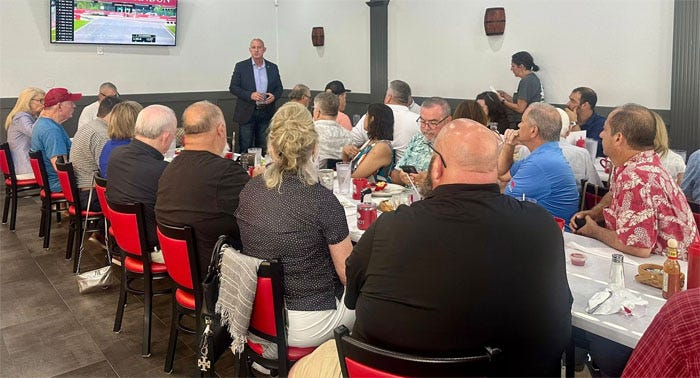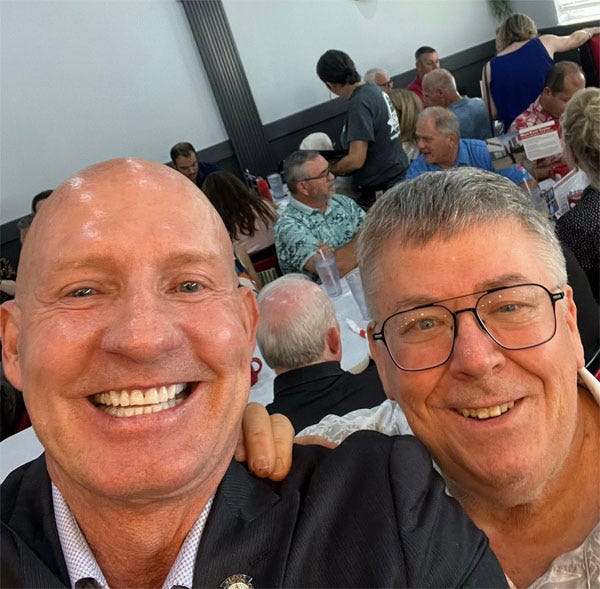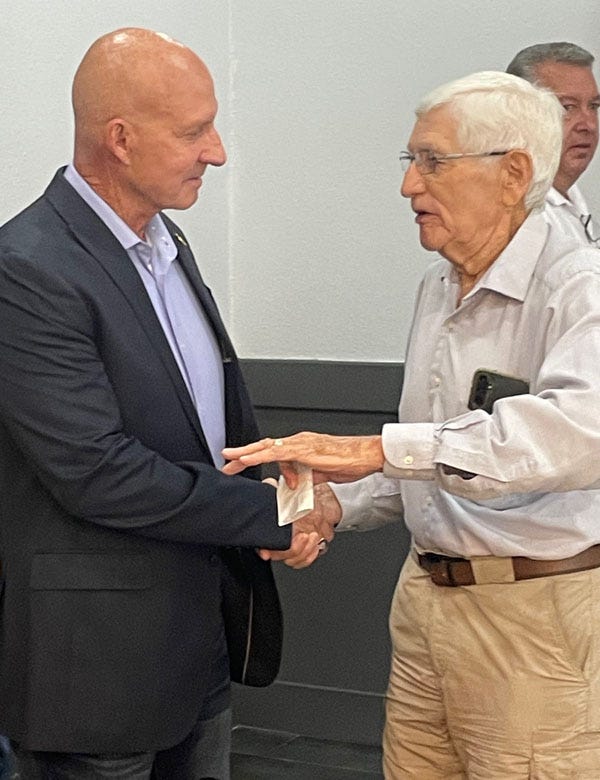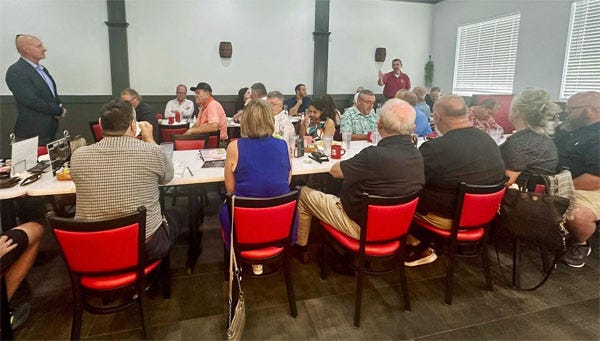Darrell Weaver Campaigns for Lt. Gov.
On Public Service, Law Enforcement, and Oklahoma Economic Development
State Senator Darrell Weaver announced at Saturday’s McGrath breakfast in Tulsa that he will be a Republican candidate for Lieutenant Governor. Official filing for the office begins in April and the crowded GOP primary will take place on June 30, 2026.
“Combining my law enforcement and legislative service with my business experience will allow me to be an effective Lieutenant governor working to address the pressing problems facing Oklahomans,” Weaver said.
Weaver has a long career in public service, having served seven years in the Oklahoma Senate and as head of the Oklahoma Bureau of Narcotics and Dangerous Drugs (OBN). Several law enforcement, court, and elected officials at the event have worked with him.
Weaver and his wife have deep roots in southwest Oklahoma. He was raised in Comanche in Stephens County and his wife is from Duncan.
He credits his mother, an LPN who managed a local nursing home, for instilling a strong sense of service. Weaver began his 28-plus year law enforcement career in 1987, starting in Lawton, then Ardmore, and later as a supervisor focusing on drug enforcement and intelligence related to high-intensity drug trafficking, including cartels in Oklahoma.
Weaver became the Oklahoma Bureau of Narcotics (OBN) Director in 2006 after the untimely death by heart attack of the previous director. He set 21 specific goals and objectives for the agency, including expanding OBN’s reach beyond metro areas and improving agency facilities. He oversaw the construction of two new agency buildings, moving out of inadequate facilities at the Lincoln Plaza building (which were so bad that snakes were kept as pets to control the rat population). Weaver’s tenure as director lasted over nine years, making him the longest-sitting director in OBN history. Weaver is an inductee of the Oklahoma Law Enforcement Hall of Fame, a graduate of the FBI National Academy and the Senior Management Institute for Police.
During Weaver’s tenure at OBN Major Initiatives and Achievements include:
Opioid Crisis Response: Launched a statewide prescription drug take-back program to safely dispose of unused and unwanted medications from home cabinets, now with over 250 locations, designed to allow disposal without investigation.
Human Trafficking Legislation: In 2012, he led research and legislative efforts, leveraging the Bureau's covert undercover experience, to address human trafficking in Oklahoma, resulting in new state laws signed by Governor Fallin.
Drug-Endangered Children: Developed programs to protect children affected by drug-related crimes, recognizing them as "collateral damage" during search warrants when parents are arrested.
Community Impact: Shared a personal story of meeting a mother whose daughter was rescued from a trafficking operation on Lincoln Boulevard in Oklahoma City, highlighting the real-world impact of OBN’s work.
After leaving OBN in 2015, Weaver became CEO of Big Brothers Big Sisters of Oklahoma for about a year and a half, motivated by the statistic that children of incarcerated parents are seven times more likely to be incarcerated themselves.
He entered the Oklahoma Senate in 2018, ran unopposed in 2022, and is currently in his second term, choosing not to run for re-election despite being eligible for one more term. Weaver and his wife,Kim, an OB-GYN who retired from delivery, started a chain of five health clinics in rural Oklahoma (Chickasha, Ardmore, Lawton, Duncan, and Norman), focusing on natural health, weight loss, and hormone therapy, while still providing prescriptions.
Priorities to Move Oklahoma Forward
Aerospace Industry: As a general aviation pilot and Vice Chair of Aerospace and Transportation, Weaver sees aerospace as Oklahoma’s second-largest industry and a key area for economic diversification, advocating for creating airports with sufficient runway space to attract commercial traffic.
Oil and Gas: Recognizes oil and gas as a $55 billion contributor to Oklahoma's gross product, acknowledging it's unlikely to be replaced soon, but stresses the need to relieve economic pressure by diversifying.
Rural Health: Advocates for cooperation with tribal partners and rural hospitals to maintain crucial healthcare access in rural areas, warning of quick trouble if these services are lost.
Judicial Nominating Committee (JNC) Reform: Weaver anticipates reforms are coming, reflecting public dissatisfaction, evidenced by a Supreme Court justice recently being voted off, and believes Oklahomans want judges who interpret the law.
Oklahoma Data Centers: Acknowledges growing concerns about environmental and community impacts, stating that the state has not studied the issue enough and calls for more research and discussion at the state level, noting more discussion in the House than the Senate.
Tourism Major Economic Pillar: Citing Oklahoma’s extensive lake shoreline (second most in the United States) and tribal heritage, recalling questions about tribal nations at the FBI National Academy in 1999.
Notes increasing migration into Oklahoma, especially from Texas, and the importance of creating an environment that retains young people and families, personally wanting his five children and one grandchild to stay in Oklahoma.
Highlights the positive impact of national sports exposure (e.g., Oklahoma City Thunder and the Devon Tower skyline) on the state’s image, correcting the misconception that Oklahomans still live in teepees and showcasing the state's vibrant economy.
On Facebook after the event, Weaver shared in part, “I was honored to speak at the McGrath Breakfast this morning! It was great catching up with our Tulsa friends! We are grateful for Jon McGrath’s support for law enforcement & public safety!






Thanks. You are very kind to let me know. Fixing now.
Who ?